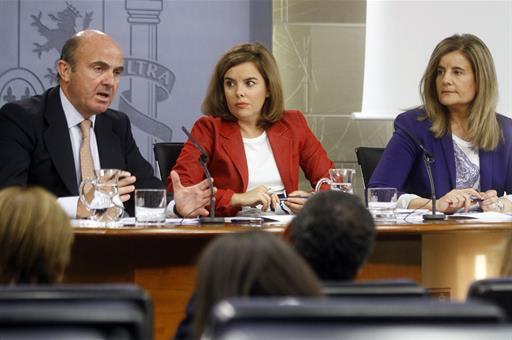Council of Ministers
Government approves measures to boost employment and foster viability of companies
Council of Ministers - 2014.9.5
Moncloa Palace, Madrid
The Council of Ministers approved the Spanish Strategy to Boost Employment 2014-2016; the Annual Employment Policy Plan 2014, and the distribution of more than 1.2 billion euros to the regional governments for active employment policies. Moreover, it presented reports on the future portfolio of common services of the National Employment System and on the reform of the Employment Training System.
The Minister for Employment and Social Security, Fátima Báñez, argued that we are faced with a very different economic backdrop when compared with that at the start of the legislature, since the figures show that for the first time since the crisis began there is sustainable employment growth and a drop in unemployment. Fátima Báñez pointed to the fact that in the last year, 230,000 people have joined the job market and recorded unemployment has fallen by 270,000 people. Moreover, in the second quarter of 2014, following 23 consecutive quarters of declines, growth in the Gross Domestic Product (GDP) was comparable with employment growth.
The minister acknowledged that more than 4 million citizens are still out of work, and hence the government's challenge is to help them rejoin the labour market, particularly groups suffering the greatest difficulties. In this regard, she recalled that the President of the Government made a commitment to the Presidents of the Regional Governments, at the Conference of Presidents in October 2012, to "analyse, evaluate, reorganise and modernise active employment policies".
Along the same lines, the Vice-President of the Government, Soraya Sáenz de Santamaría, indicated that "the challenge now is to incorporate more jobless into the labour market so that they can become part of the economic reactivation".
Fátima Báñez stressed that active employment policies have never suffered from a lack of resources, but the effectiveness, evaluation, supervision and results of these policies have failed. "The challenge we face is to transform these resources into results", she said.
In order to achieve this objective, the minister explained that initiatives have already been implemented in collaboration with the regional governments and private initiatives, of which Single Employment Portal, Dual Vocational Training, the Entrepreneurship and Youth Employment Strategy and the Youth Guarantee Programme, are particularly noteworthy.
 Pool MoncloaIn addition to these initiatives is the Spanish Strategy to Boost Employment, which will guide policies according to their results in such a way that the assessment of the results will condition the distribution of funds in subsequent financial years. "None of our peer countries, not even Germany, ties in the funds for the following year to the results from the previous year. Spain is doing this gradually, but this will be stepped up as from next year", announced Fátima Báñez.
Pool MoncloaIn addition to these initiatives is the Spanish Strategy to Boost Employment, which will guide policies according to their results in such a way that the assessment of the results will condition the distribution of funds in subsequent financial years. "None of our peer countries, not even Germany, ties in the funds for the following year to the results from the previous year. Spain is doing this gradually, but this will be stepped up as from next year", announced Fátima Báñez.
In her opinion, in addition to improving employability, the strategy will optimise the quality of training for job insertion, will link active and passive employment policies and will drive entrepreneurship. Long-term objectives are also established, among which she highlighted specialised attention for each person out of work and the modernisation of the public employment services.
The government has also approved the Annual Employment Policy Plan 2014, which puts specific aspects of the strategy into action and responds to six major pillars: guidance, training, job opportunities, equal opportunities, entrepreneurship and an improvement in the institutional framework of the National Health System.
On another note, the government agreed to distribute 1.25 billion euros to those regional governments with powers to implement active employment policies. Fátima Báñez announced that next year, 60% of the funds will be allocated according to the objectives.
Portfolio of services and training
 Pool MoncloaThe Council of Ministers analysed a report on the future Portfolio of Common Employment Services to guarantee that workers have access to employment services under equal conditions throughout the country. The portfolio will be made up of four services: professional guidance; placement and corporate advice; training and qualifications for employment; and advice on self-employment and entrepreneurship.
Pool MoncloaThe Council of Ministers analysed a report on the future Portfolio of Common Employment Services to guarantee that workers have access to employment services under equal conditions throughout the country. The portfolio will be made up of four services: professional guidance; placement and corporate advice; training and qualifications for employment; and advice on self-employment and entrepreneurship.
The government also studied a report on the reform of the Vocational Training System for Employment, drawn up with contributions from social stakeholders, trade unions and business organisations.
Fátima Báñez stressed that the vocational training policies are not leading to the right results because six out of ten students did not acquire new skills and techniques applicable to the labour market and only 17% of them found a job related to the course they had attended. Furthermore, between 2007 and 2013, more than half the workers who did not pass basic education lost their job while the number of people in work with higher education studies actually increased by 2%.
The new system will come into force on 1 January 2015, announced the minister, and it will be geared to satisfying the needs of our productive fabric. Workers will have a logbook detailing and certifying all training received in the course of their working life. The evaluation of the quality of the services will be ongoing and a specialised work inspection unit will be set up to avoid fraud.
Reform of the Insolvency Act
 Pool MoncloaThe Council of Ministers approved a Royal Decree-Law on urgent insolvency measures, which seeks to facilitate agreements that allow companies entering into insolvency proceedings to remain trading.
Pool MoncloaThe Council of Ministers approved a Royal Decree-Law on urgent insolvency measures, which seeks to facilitate agreements that allow companies entering into insolvency proceedings to remain trading.
The Vice-President of the Government, Soraya Sáenz de Santamaría, stated that the measure seeks to guarantee the survival of companies that are in financial difficulties but which are still viable. The Minister for Economic Affairs and Competition, Luis de Guindos, clarified that 95% of all companies that enter into insolvency proceedings go into liquidation and this percentage is far higher than in our peer countries. In this respect, the minister added that an "active company is something of value and it is much easier to avoid a company going into liquidation than create a new one".
The minister explained that the new legislation complements the measures already implemented in the pre-insolvency phase and acts at a level of insolvency proceedings by facilitating agreements between the various creditors: public, financial, labour and commercial. From then on, a procedure is applied for decision-making that enables debt to be reduced and to convert debt into capital according to the decisions taken by the creditors.
Furthermore, the measures helps ensure that privileged creditors, in other words those with a mortgage guarantee, do not obstruct decisions taken on the global debt of these companies.
The Royal Decree-Law facilitates the sale of a company in its entirety, thereby avoiding different classes of assets from being sold off individually, which often leads to the company going into liquidation. Luis de Guindos stated that the transfer of the company will be facilitated, as will the subrogation of the different types of new purchaser vis-à-vis the previous types, and a series of actions will be established which, in his opinion "will help ensure that companies in the final phase of insolvency proceedings are able to carry on their economic activities", which is preferable for the country's economic activity as a whole, for workers and for creditors, who will have a higher collection percentage guaranteed than they would obtain in the event of the liquidation of the company.
This text gives effect to a ruling handed down by the Court of Justice of the European Union such that a mortgage debtor can file an appeal against the decision that repeals his objection to the enforcement thereof in the event that it is founded on the existence of a contractual clause which is deemed to be abusive.
Furthermore, it provides for the creation of a telematic portal at the Official State Gazette (Spanish acronym: BOE) with information on companies in liquidation so that potential buyers can obtain updated information. A supervision committee will also be set up to analyse how levels of indebtedness are evolving and to propose measures to the government to improve debt reduction.
Current affairs
 Pool MoncloaIn relation to the statements made by the President of the Regional Government of Catalonia, Artur Mas, to the effect that the government will not file an appeal before the Constitutional Court against the Catalan Act authorising the referendum on sovereignty, the Vice-President of the Government, Soraya Sáenz de Santamaría, stressed that no governor can ask the government not to comply with the law or ensure that it is upheld; "we cannot be asked not to comply with our obligation. If a law is unconstitutional, it is the government's obligation to appeal against it" and, if its effects are unable to be overturned, file for its suspension. She also reiterated that "the offer for dialogue has been made" to tackle the needs of the Catalan people and their specific features, and added that Artur Mas should consider that "renouncing the needs of the Catalan people or prejudicing them is too high a price to pay and should not exist".
Pool MoncloaIn relation to the statements made by the President of the Regional Government of Catalonia, Artur Mas, to the effect that the government will not file an appeal before the Constitutional Court against the Catalan Act authorising the referendum on sovereignty, the Vice-President of the Government, Soraya Sáenz de Santamaría, stressed that no governor can ask the government not to comply with the law or ensure that it is upheld; "we cannot be asked not to comply with our obligation. If a law is unconstitutional, it is the government's obligation to appeal against it" and, if its effects are unable to be overturned, file for its suspension. She also reiterated that "the offer for dialogue has been made" to tackle the needs of the Catalan people and their specific features, and added that Artur Mas should consider that "renouncing the needs of the Catalan people or prejudicing them is too high a price to pay and should not exist".
As regards the anomaly detected on Friday morning in the Twitter account of the President of the Government, the Vice-President of the Government reported that the team responsible for social networks of the President of the Government has opened an investigation into the matter and has contacted the social network site to clarify the events.
The Minister for Employment and Social Security highlighted the recognition contained in the report issued by the OECD of the reforms undertaken by the government that have led to the Spanish economy gaining competitiveness "without leading to a deterioration in working conditions". In this respect, she recalled the agreement signed between the President of the Government and the main social stakeholders for strengthening economic growth and job creation signed in July.
The Minister for Economic Affairs and Competition, Luis de Guindos, highlighted that the growth of the Spanish economy has speeded up in the last six months, despite the slowdown of the Eurozone in the same period, and asserted that the current potential risks for our economy "are not home-grown, but external" and that the Spanish economy "is in a much better position" to tackle them.





